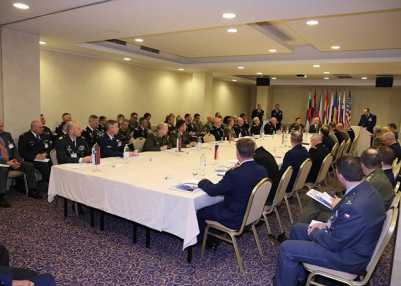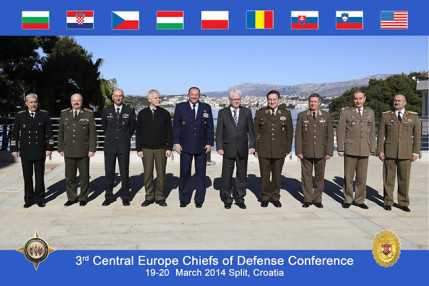Central European Military Leaders Hold Discussions in Split
Szöveg: Defence Staff | 2014. március 27. 9:07The third Central Europe Chiefs of Defense Conference was held between March 19–20, 2014. Organized for the first time by Hungary and then by Poland, this year’s conference was hosted by Split, Croatia. Gen. Dr. Tibor Benkő represented Hungary at the event.

The attendees exchanged opinions on key issues
Following the arrival on March 19 and the welcome ceremony, there was a bilateral American–Hungarian discussion in which Gen. Benkő and Gen. Breedlove looked at the most important current issues concerning the two countries. Among other topics, they discussed the aspects of the post-election situation in Afghanistan. During the discussion, Gen. Benkő informed his American partner that the Hungarian Defence Forces are intending to deploy with KFOR part of their forces after their withdrawal from Afghanistan, because a satisfying resolution to the situation in Kosovo is a priority for Hungary. For this reason, from July on Hungary is willing to deploy around 170 more troops to increase its presence in the region. The Chief of Defence of the Hungarian Defence Forces explored the possibility of participation by the US Ohio National Guard, considering that it would ensure continuing cooperation within the State Partnership Program which started more than 20 years ago.
Speaking about the use of the HDF Pápa Air Base, Gen. Benkő was of the opinion that the utilization of the aerodrome still has considerable potential. Gen. Breedlove answered that he thought it would be possible to station air-to-air refueling aircraft there, which would be modeled on, for example, the way it works in the case of the AWACS aircraft, with the participation of 28 nations. While discussing another topic on the agenda – the V4 Battle Group to be set up – the two partners agreed that the battle group, whose capability would meet NATO standards, would be deployable not only in the EU but also in NATO in a given case. Due to its present relevance, the military representatives of the two countries also exchanged opinions about the current situation in Ukraine. Speaking about this, the Chief of the Defence Staff stressed that Hungary is committed to finding a peaceful way out of the critical situation.
On the second day of the conference, multilateral discussions started with an opening address delivered by the President of the Republic of Croatia. In the first phase of the meeting, the Central European chiefs of defence exchanged opinion about the expected threats after the completion of the ISAF mission in Afghanistan and the options for dealing with them. They paid special attention to the issues of non-proliferation, missile defence and cyber defence. In this regard, the Chief of the Defence Staff was of the opinion that we are interested in building a system of missile defence which provides the greatest protection for the citizens and territory of Hungary, strengthens cohesion and solidarity in the Alliance, and can be implemented in a cost-effective way, as far as possible.

Group photo
The conference specifically focused on present-day challenges as well as newly emerging ones which pose an increasing danger to the security of the international community besides conventional threats. The attendees all agreed that communication and information systems (CIS) play a key role in the workings of advanced societies, and as they are increasingly dependent on these systems, they are becoming more and more vulnerable. The characteristics of cyber threats differ from those of conventional ones, which calls for a comprehensive survey and, possibly, revision of our concepts related to war. Considering that the creation of cyber security is a global transnational task, Hungary attaches great importance to exploring the scope of cooperation with international organizations (primarily with the UN, the OSCE, NATO and the EU).
During the day, there were some further issues on the agenda like cooperation in humanitarian assistance and disaster relief, which may become key tasks. In closing the conference, the chiefs of defence discussed current issues and the scope of cooperation in the Smart Defence (SD) and the Connected Forces Initiative (CFI) launched in 2010. The program is focused on ensuring the availability of capabilities required to attain NATO’s objectives in spite of the financial crisis. The attendees of the conference set the goal of keeping the Alliance “committed, capable and connected" in a time of economic austerity.